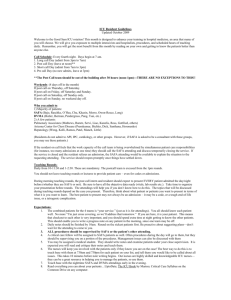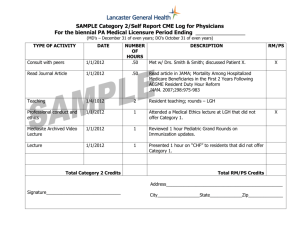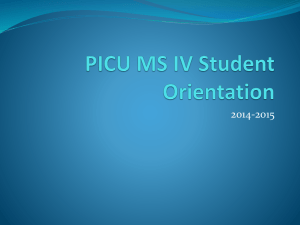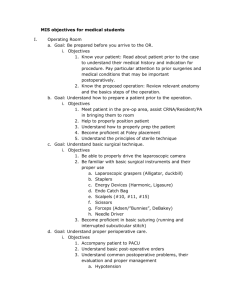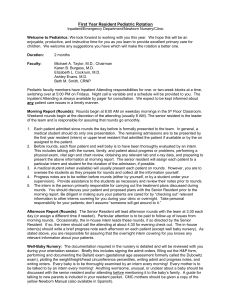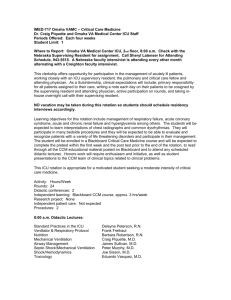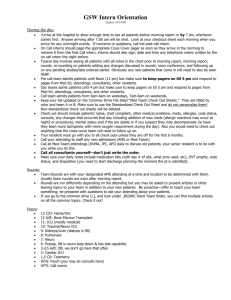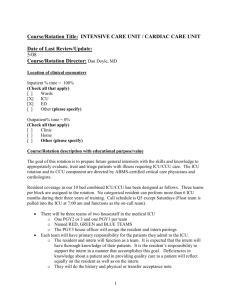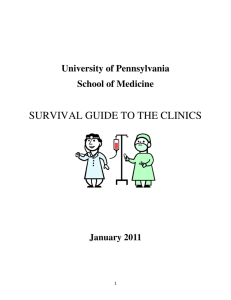ICU Resident Guidelines
advertisement
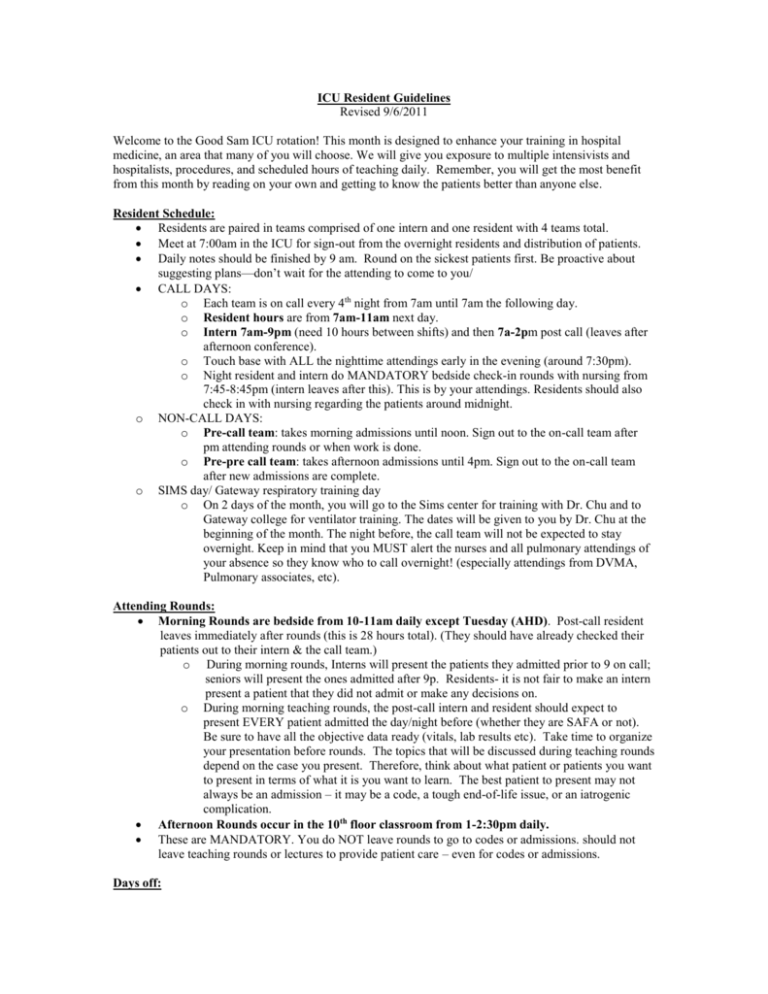
ICU Resident Guidelines Revised 9/6/2011 Welcome to the Good Sam ICU rotation! This month is designed to enhance your training in hospital medicine, an area that many of you will choose. We will give you exposure to multiple intensivists and hospitalists, procedures, and scheduled hours of teaching daily. Remember, you will get the most benefit from this month by reading on your own and getting to know the patients better than anyone else. Resident Schedule: Residents are paired in teams comprised of one intern and one resident with 4 teams total. Meet at 7:00am in the ICU for sign-out from the overnight residents and distribution of patients. Daily notes should be finished by 9 am. Round on the sickest patients first. Be proactive about suggesting plans—don’t wait for the attending to come to you/ CALL DAYS: o Each team is on call every 4th night from 7am until 7am the following day. o Resident hours are from 7am-11am next day. o Intern 7am-9pm (need 10 hours between shifts) and then 7a-2pm post call (leaves after afternoon conference). o Touch base with ALL the nighttime attendings early in the evening (around 7:30pm). o Night resident and intern do MANDATORY bedside check-in rounds with nursing from 7:45-8:45pm (intern leaves after this). This is by your attendings. Residents should also check in with nursing regarding the patients around midnight. o NON-CALL DAYS: o Pre-call team: takes morning admissions until noon. Sign out to the on-call team after pm attending rounds or when work is done. o Pre-pre call team: takes afternoon admissions until 4pm. Sign out to the on-call team after new admissions are complete. o SIMS day/ Gateway respiratory training day o On 2 days of the month, you will go to the Sims center for training with Dr. Chu and to Gateway college for ventilator training. The dates will be given to you by Dr. Chu at the beginning of the month. The night before, the call team will not be expected to stay overnight. Keep in mind that you MUST alert the nurses and all pulmonary attendings of your absence so they know who to call overnight! (especially attendings from DVMA, Pulmonary associates, etc). Attending Rounds: Morning Rounds are bedside from 10-11am daily except Tuesday (AHD). Post-call resident leaves immediately after rounds (this is 28 hours total). (They should have already checked their patients out to their intern & the call team.) o During morning rounds, Interns will present the patients they admitted prior to 9 on call; seniors will present the ones admitted after 9p. Residents- it is not fair to make an intern present a patient that they did not admit or make any decisions on. o During morning teaching rounds, the post-call intern and resident should expect to present EVERY patient admitted the day/night before (whether they are SAFA or not). Be sure to have all the objective data ready (vitals, lab results etc). Take time to organize your presentation before rounds. The topics that will be discussed during teaching rounds depend on the case you present. Therefore, think about what patient or patients you want to present in terms of what it is you want to learn. The best patient to present may not always be an admission – it may be a code, a tough end-of-life issue, or an iatrogenic complication. Afternoon Rounds occur in the 10th floor classroom from 1-2:30pm daily. These are MANDATORY. You do NOT leave rounds to go to codes or admissions. should not leave teaching rounds or lectures to provide patient care – even for codes or admissions. Days off: If you are not on -all or post-call on the weekend, you are off. This will give you one “golden weekend” during the month. So on Saturday and Sunday, only the on-call team & the post-call team are working. All other teams are off. The resident will also get one extra day off during the 14 day stretch (the Friday pre-call day before your Saturday call). When he/she is gone, the call senior will supervise the orphan intern. Death Notes: AT BGSMC, when a patient dies, there is a new requirement for a specific note type to outline the cause of death. So, if you write a death note as a ".Physician Progress Note", it's not good enough. They require a specific note type that shows up as follows under Reports and Docs: ".Prelim Cause of Death-Pronounce Note" o To generate such a note: Go to PowerNote and click +ADD. Go to the catalog. Near the bottom, there is a template called "Pronouncement & Prelim. Cause of Death". SINGLE CLICK that. On the top of the new box under "*Type" be sure to single click ".Prelim Cause of Death-Pronounce Note" . Fill in the Title. Adjust Time/Date as necessary. Click OK. This will open up a power note template where you can fill in your final physical exam and record the time of death. This note also needs to record the proximate cause of death and associated diagnoses (I.E: the diagnoses that go on the death certificate). Responsibilities: The interns are responsible for writing daily notes on the patients and the resident should see the patients as well, review the intern note, physical exam, plan, and write a short addendum. The intern will do the H&Ps on new patients and residents will addend the H&P. Residents are responsible for contacting the attending who is seeing your patient that day and staffing the patient with them. If the list is large, the resident should use their judgment on assisting the intern with note-writing and seeing some of the patients for them. Who you admit to: SAFA (Bajo, Raschke, O’Hea, Chu, Khazin, Morro, Owen-Reece, Long) DVMA (Butler, Berman, Pendergrass, Pang, Tsai, etc.) Pulmonary Associates (Mathews, Baratz, Servi, Liao, Kunelis, Ross, Gotfried, others) Arizona Center for Chest Disease (Premkumar, Bichler, Dick, Santhana, Horonenko) Hepatology (Wong, Kolli, Ramos, Manch, Little) (Residents do NOT admit to API, IPC, Cardiology, or other groups. However, if SAFA is asked to be a consultant with these groups, you may see these patients.) If the resident on call feels that the work capacity of the call team is being overwhelmed by simultaneous patient care responsibilities (for instance, too many admissions at one time) they should call the SAFA attending and discuss temporarily closing the service. If the service is closed and the resident refuses an admission, the SAFA attending would be available to explain the situation to the requesting attending. The service should reopen promptly once things have settled down. Codes/Rapid Responses: The call team goes to ALL of the codes and rapid responses. If you are the resident and you are running the code, introduce yourself immediately as the ICU resident and state that you are running the code. The attending will observe you running the code, interject if needed, and evaluate you at the end of the code. The intern should do chest compressions, checking for a pulse, and assist with lines and whatever else may be needed. Don’t be afraid to get involved! The on-call resident will have a key and a digital code for the elevators (4848). Expectations: 1. The combined patients for all of the 4 teams is “your service.” (just as it is for attendings). Everyone should know each patient well. No more “I’m just cross covering, so we’ll address that tomorrow.” If you are here, it is your patient. This means that checkout to each other is very important, and you should spend extra time at night getting to know the other patients. This should enable you to write a progress note on any patient in the morning, since one team may be off. 2. Procedures: a. ALL procedures should be supervised by SAFA or the patient’s other attending, regardless of how experienced the resident is. Please record procedures in New Innovations. b. A critical care fellow will be assigned to SAFA patients as well. Often procedures during the day will go to them, but they should be supervising you on a portion of the procedures. Management issues can also be discussed with them. 3. Medical Students: They should write notes and examine patients under your close supervision. It is expected you will read and critique their notes and teach them. 4. Nurses: The nurses will keep you involved with the patients only if they know you are on the case! The best way to do this is to touch base with them at 7:30am and 7:30pm for each patient on your list, and tell them you would like to be called about all issues. This takes 10 minutes before note writing begins. Our nurses are highly skilled and knowledgeable ICU nurses—they can be a great resource in helping you to manage the patients, so use them. 5. Read everything you can about your patients…UptoDate; The ICU Book by Marino; Critical Care Syllabus on the Common Drive on any computer, etc.
